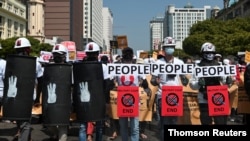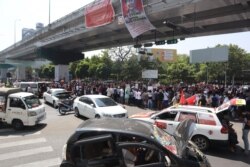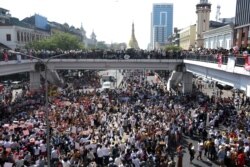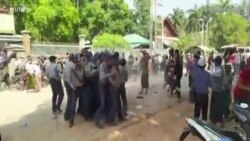An apparent record number of people demonstrated in Myanmar Wednesday against the military since it’s Feb. 1 coup, despite a ban on gatherings of at least five people.
Protesters took to the streets in the capital of Naypyitaw, the country’s second largest city of Mandalay and in Yangon, where the turnout appeared to be one of the biggest since the military takeover.
Scores of private and public sector employees and civil servants joined the mass demonstrations against the coup by walking off their jobs, despite a military order to return to work and threats of action against them.
There were no reports of significant violence, but protesters blocked police and military vehicles in Yangon by continuing the practice of blocking major thoroughfares with vehicles parked in mid-street with their hoods raised while using engine trouble as an excuse.
Protesters also streamed into the streets of Mandalay, where security forces two days earlier pointed guns at about 1,000 demonstrators and attacked them with sticks and slingshots. Local news accounts said police also fired rubber bullets into a crowd, injuring several people.
In Naypyitaw, engineers and bank employees joined thousands of people in a march down the city's major streets, chanting for the release of de facto leader Aung San Suu Kyi and President U Win Myint.
One motorist told VOA’s Burmese Service that he joined the “broken-down car campaign” to disrupt transportation.
An organizer of the civil disobedience movement said some government workers are reluctant to participate, leaving it to the youth to engage in tactics like the broken-down car campaign.
But one railway worker told VOA’s Burmese Service that he (she) and his (her) colleagues do not care about the consequences of joining the movement as they demand a return to the civilian government they voted into office.
The leader of the pro-democracy group 88 Generation Students, Min Ko Naing, distributed an audio message urging protesters to continue demonstrating Wednesday with the intent of eventually disrupting the military government.
Wednesday’s demonstrations came one day after the United Nations warned of “the potential for violence on a greater scale.”
Security forces have grown increasingly aggressive against the protesters, firing warning shots, rubber bullets and water cannons in an effort to disperse the crowds. The country’s Assistance Association for Political Prisoners group said more than 450 arrests had been made since the coup, many of them in night-time raids.
Tom Andrews, the U.N. Special Rapporteur on the situation of human rights in Myanmar, said Tuesday in a written statement that such troop movements during the previous junta “preceded killings, disappearances, and detentions on a mass scale."
“I am terrified that given the confluence of these two developments — planned mass protests and troops converging — we could be on the precipice of the military committing even greater crimes against the people of Myanmar,” Andrews said.
The regime briefly shutdown Internet services Tuesday for a third consecutive night.
The military has cited widespread fraud in last November’s general elections, won by Suu Kyi’s National League for Democracy in a landslide, as justification for the takeover. Those claims were rejected by Myanmar’s electoral commission. The junta has declared a one-year state of emergency and has promised to hold a new round of elections.
Suu Kyi has been under house arrest at her official residence in Naypyitaw since the coup. Authorities filed a second charge Tuesday against Suu Kyi in an apparent legal maneuver that could keep her detained indefinitely.
Suu Kyi’s lawyer told reporters in Naypyitaw after meeting with a judge that she was charged with violating the country’s COVID-19 containment restrictions. She was previously charged with illegally possessing imported walkie-talkie radios without a license. Violating the law is punishable by a maximum of three years in prison.
President U Win Myint is also under house arrest.
Western nations have strongly condemned the coup in Myanmar, and even China has begun to express concern about the situation. Chen Hai, Beijing’s ambassador to Naypyitaw, said Tuesday that current state of affairs is “absolutely not what China wants to see.”










